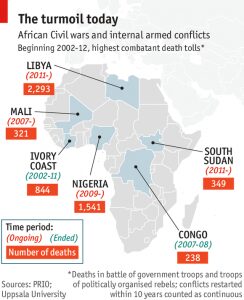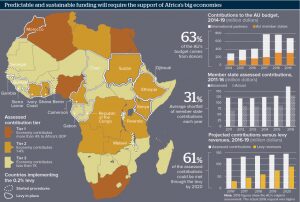Britain’s vote to ditch the European Union offers the chance of a new beginning—not just for the EU, and the U.K., but for Africa. Since most countries on the continent gained independence in the 1960s and 1970s, they have mindlessly mimicked Western political institutions. Rome has a basilica; so, too, must Yamoussoukro in Ivory Coast. France once had an emperor, so Jean-Bédel Bokassa spent $25 million on a coronation ceremony in the Central African Republic. The United States has a space center. Now Nigeria does too, at the cost of $89 million, though more than half its population lives on less than $1.25 per day. Of the putrid carcasses of failed foreign systems that litter the continent, none is more rancid than the African Union, which, as it happens, was modeled on the EU.
Since at least the start of the global financial crisis, and certainly since last month’s Brexit referendum, the EU has proved it can’t work for Europe. African leaders should now admit that a meretricious caricature of it can’t possibly work for Africa.
The body has yet to solve a single conflict diplomatically, and where it has sent peacekeepers—to Darfur, Somalia, and Mali, for instance—peace has yet to emerge.
As the successor institution to the Organization of African Unity (OAU), the first pan-African body of the postcolonial era, the AU was founded in 2001. It was the brainchild of the late Libyan strongman Muammar al-Qaddafi, who, having previously crowned himself “King of Kings,” no doubt harbored delusions of becoming the continent’s first president. (He would have to settle for the AU chairmanship, which he held from 2009 to 2010.) The aim of the new body was to present a united African front in international affairs and to speed up the development of the continent. But the AU was hobbled from the start by its poor structural design, which was both too centralized and too weak to function as envisioned.
The AU concentrates decision-making authority in the AU Commission, an executive branch roughly analogous to the European Commission, which initiates policy proposals and implements decisions taken by the larger AU Assembly, among other AU organs. The AU Commission controls the purse strings, and member states have little influence over the drafting of proposals and initiatives. This level of centralization has proved unworkable in a continent of 54 countries and more than 2,000 distinct ethnic groups. The AU Commission’s authority mostly serves to create suspicion and intrigue and ultimately to instill resistance in member states to the body’s dictates.
Equally misguided is the AU’s preference for inclusivity. Unlike EU countries that had to meet certain political and economic benchmarks for membership, any rogue or deadbeat African country has always been allowed to join the AU. In fact, 18 countries should have been disqualified for not paying membership dues to the OAU, but Qaddafi paid off their debts so they could join. The AU also embraced a policy of noninterference in the affairs of member states, so as not to scare off those governments accused of war crimes or with abysmal human rights records. Every African country except Morocco is currently a member.
No Marshall Plan will work in Africa’s underdeveloped markets… Africa requires building anew, not rehabilitation or reconstruction.
Not surprisingly, the AU has achieved spectacularly little in its decade and a half of existence. It is famous for its annual summits, where unrepentant despots sip champagne and applaud their own longevity while issuing preposterous communiqués that nobody else in the world pays attention to. In 2011, as Libya descended into civil war, the AU sent its chairman, Teodoro Obiang Nguema Mbasogo of Equatorial Guinea—Africa’s longest-serving dictator—to resolve the crisis and smooth the transition to democracy.
The body has yet to solve a single conflict diplomatically, and where it has sent peacekeepers—to Darfur, Somalia, and Mali, for instance—peace has yet to emerge. The continental body can’t even seem to agree on a definition for democracy, certifying all elections as free and fair instead. (To condemn as undemocratic the recent jailing of opposition leaders in, say, Rwanda, Uganda, and the Democratic Republic of the Congo would be to violate the vaunted principle of noninterference.)

The AU has proved equally inept on the economic front. The body couldn’t even afford to build its own headquarters, so China picked up the tab for its glitzy $200 million building in Addis Ababa, Ethiopia. Of course, any number of corrupt African dictators could have funded the headquarters. Sudan’s president, Omar al-Bashir, for one, is worth an estimated $9 billion. Even Isabel dos Santos, the daughter of Angola’s president, could have built it with her personal fortune of $3.2 billion. But it’s what has happened—or hasn’t happened—inside those headquarters that is the real disgrace. It was hoped that the AU could help spur industrialization by facilitating deeper economic integration and building much-needed infrastructure, including roads, railways, and telecommunications systems. It has failed spectacularly on both fronts.
One supposed bright spot on the AU’s otherwise dismal record was the New Partnership for Africa’s Development (NEPAD), hailed at its unveiling in 2001 as Africa’s own economic plan— one not dictated from the outside by the World Bank or the International Monetary Fund. NEPAD called for $64 billion in Western investment, mainly for infrastructure development, without the onerous conditions typically imposed by international financial institutions.
Despite being trumpeted as “Africa’s own initiative,” NEPAD was, in fact, modeled on the American Marshall Plan, which rebuilt Europe after World War II, with Western investors standing in for the U.S. government. Not surprisingly, what worked for postwar Europe did not work for Africa, since the continent was building new institutions and infrastructure from scratch, not repairing damaged ones. As Adebayo Adedeji, a Nigerian politician who served as the executive secretary of the U.N. Economic Commission for Africa, remarked in 2002, “No Marshall Plan will work in Africa’s underdeveloped markets… Africa requires building anew, not rehabilitation or reconstruction.”
In 2003, South African President Thabo Mbeki, then-chairman of the AU, conceded that NEPAD was in grave danger of failing because most African countries were not capable of effectively utilizing investments on the scale envisioned by the partnership. They simply lacked the capacity. Three years later, NEPAD was on its deathbed anyway, since most of the investments never materialized. “NEPAD has failed,” then-Senegalese President Abdoulaye Wade, one of the partnership’s chief architects, said at a press conference in 2006. “NEPAD has not built a single mile of road.”

The African Union has a plan for financial self-reliance, but implementation is lagging behind the aspiration. — Oxford Analytica
A year later, in 2007, Qaddafi, the godfather of the AU, delivered a similarly damning indictment of the institution he helped build. Speaking in the Guinean capital of Conakry, he called the African Union a failure and argued that the current arrangement of individual states was unsustainable. Deeper integration was his suggested solution. Qaddafi proposed the formation of an African Parliament to be established in Tripoli at a time when Libya had no such body. “Let those who are hesitating [to] get out of our way,” he said. “For 40 years, all the summits have failed. Our microstates have no future.”
Qaddafi may have been deluded and a tyrant and his blithe proposal for a United States of Africa indicates as much, but his critique of the African Union was sound. Africa must stop blindly copying the West and look to its own indigenous heritage for models of political organization. The continent has a long history of effective institutions for good governance: loose confederacies, participatory forms of democracy based on consensus under chiefs, and free village markets, to name just a few. All of the ancient African empires—Mali, Ghana, Great Zimbabwe, and Songhai in what is now the western Sahel—were confederacies characterized by great devolution of authority and decentralization of power. Markets were likewise ubiquitous in precolonial Africa, and prices were typically determined by bargaining, not dictated by authorities.
Instead of a centralized but weak organization like the AU, Africa needs a looser style of confederacy that allows national actors to coordinate decisions with one another, rather than imposing choices on them. Such a confederacy should also have strict membership requirements, to ensure there is sufficient common ground for political and economic coordination and a common vision of the future. At a minimum, each member state should be democratic and respect Africa’s heritage of free markets, free enterprise, and free trade. Such a confederacy could begin with the 15 or so African countries that arguably qualify as democracies, and then add new members as they make the necessary reforms.
Brexit may foretell the end of the EU, but in Africa, it should be seen as a new beginning. Like the long list of foreign imports that preceded it, the AU has proved it won’t work. Fortunately, a better model can be found in Africa’s own backyard.
Pauline Dixon, a professor of international development and education at Newcastle University in England, contributed to this piece.
This article was originally published on July 12, 2016, by the Independent Institute.


